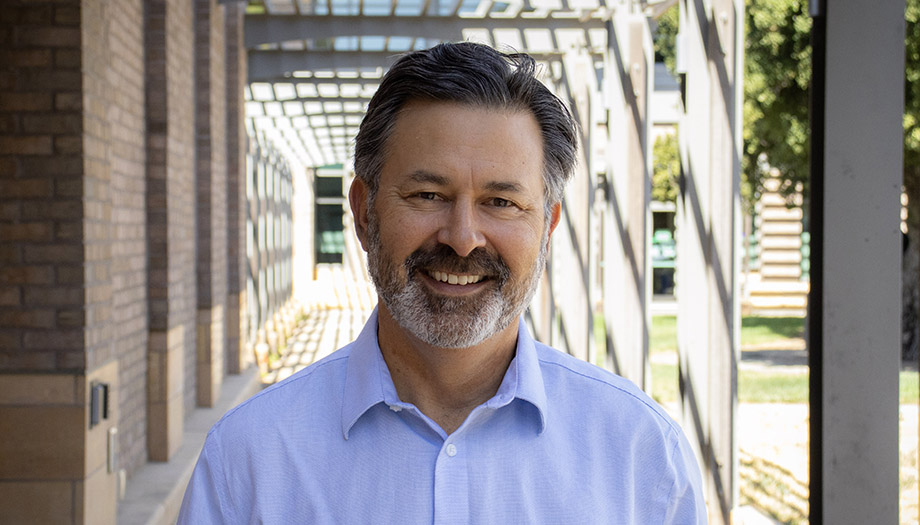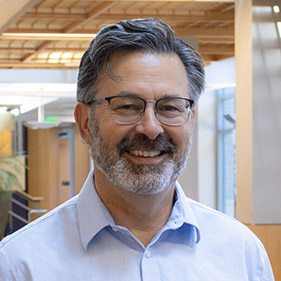$5.5 million federal grant to help researchers build tools for FXTAS treatment trials
Project will support clinical trials to treat the genetic condition fragile X-associated tremor/ataxia syndrome
UC Davis Professor of Psychiatry and Behavioral Sciences David Hessl will help lead a major research project to develop better ways to measure treatments for fragile X-associated tremor/ataxia syndrome (FXTAS). The 5-year project will be funded by a $5.5 million federal grant from the National Institute of Neurological Disorders and Stroke (NINDS).

Hessl, a UC Davis MIND Institute faculty member, will work on the research effort with physician-scientist Peter Todd at the University of Michigan and neurologist and movement disorder specialist Deborah Hall at Rush University.
“This critical project will help us to be ready when new therapies become available to test in clinical trials,” Hessl said.
What is FXTAS?
FXTAS is one of several genetic conditions linked to changes in the FMR1 gene, located on the X chromosome. When seen under a microscope, these chromosomes can appear broken, or fragile, hence the name fragile X.
These gene changes can range from a premutation (a smaller change) to a full mutation and have a variety of health impacts.
Individuals with the full mutation have fragile X syndrome, the most common inherited cause of autism and intellectual disability. Female premutation carriers can have reproductive problems. Adult premutation carriers — mostly men over 50, may develop FXTAS. It is a progressive, neurological disorder. Symptoms include tremors, balance problems and memory issues. It is sometimes mistaken for Parkinson’s disease.
FXTAS was discovered by MIND Institute researchers nearly 25 years ago.
One of the roadblocks to testing potential treatments is a lack of widely accepted validated outcome measures for clinical trials.
“FXTAS can be devastating, and scary for carriers who are at risk for developing it. We all want to see some treatments that can provide relief for patients and their families,” Hessl said. “To know if potential therapies work, we have to do a really good job of choosing the best measures that are clinically meaningful. That’s why this project is so important.”
There are likely to be new medicines soon, including gene therapies, that could help slow down or even stop the disease. We want to be ready.” —David Hessl, professor, Department of Psychiatry and Behavioral Sciences
What the study will do
Over the next five years, the team will:
- Enroll 100 people with FXTAS across the three research sites.
- Use tools like electronic sensors to measure tremors and balance, brain scans to track progression or slowing of disease and memory tests to track cognitive symptoms.
- Develop and test a new version of the FXTAS Rating Scale (FXTAS-RS), which helps doctors measure how the condition changes over time.
- Create a shared system and protocol so future clinical trials can start quickly and run smoothly.
“There are likely to be new medicines soon, including gene therapies, that could help slow down or even stop the disease,” Hessl said. “We want to be ready.”
Guidance from FXTAS patients and their families
The study will also include feedback from an advisory panel made up of patients, premutation carriers, caregivers, doctors, researchers, people from the pharmaceutical industry, and a NINDS program scientist. Importantly, the panel will include individuals and family members affected by FXTAS, ensuring that the research stays focused on what matters most to those living with the condition.

Francisco Cordero, who carries the FMR1 premutation, will be one of the panel members. He lives in Mexico City and has traveled multiple times to the MIND Institute in Sacramento to take part in fragile X-related research studies.
“I think that people learning about FXTAS is so important and I want to be involved in whatever way I can,” he said.
Not all adult males with the premutation develop FXTAS, but Cordero worries that he may be showing early signs of the condition.
“I don’t know if what is happening to me is related to FXTAS or not, but I lose my balance easily. My memory is bad. My wife is very scared of what is going to happen to me and how she will take care of me if things get more serious,” he said.
Hessl said he’s grateful to Cordero and the other panel members who are stepping up to move the research forward.
“It’s essential that we have several outcome measures that patients and caregivers say are tapping into real impacts in daily life. This is something the U.S. Food and Drug Administration takes seriously when considering medications for approval,” he said.
By the end of the project, the team will have a set of accurate measures for future trials, with the protocols and systems in place to run those trials. “We’ll be ready,” said Hessl, who has worked with fragile X families for over 25 years. “These families have given so much to our research programs. I want to do everything I can to help.”




